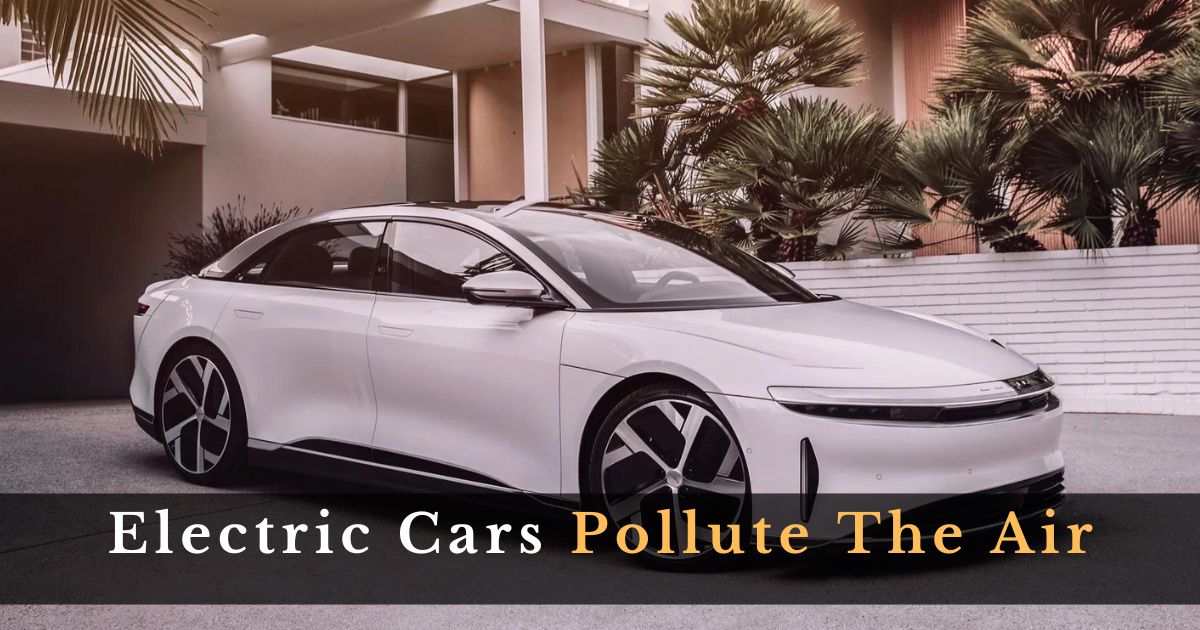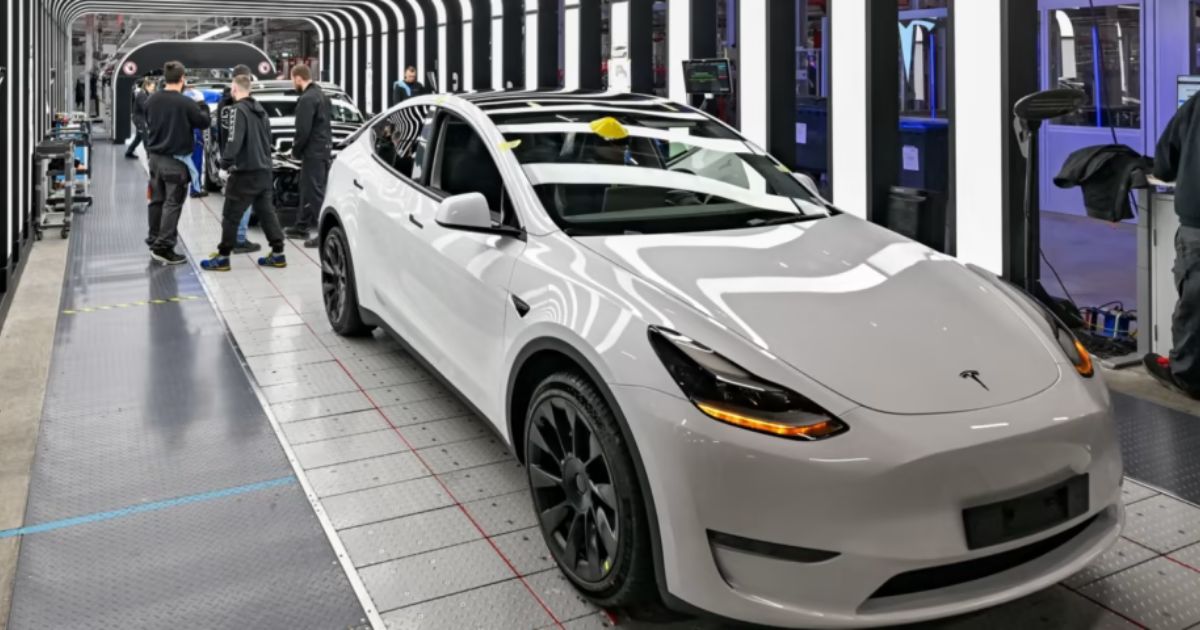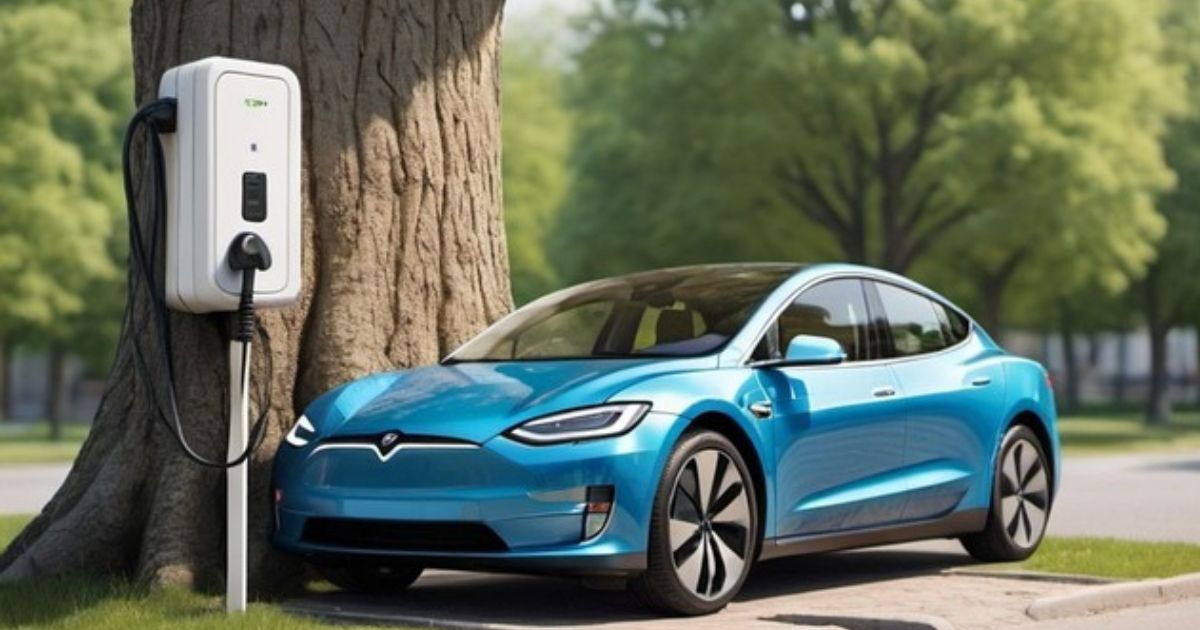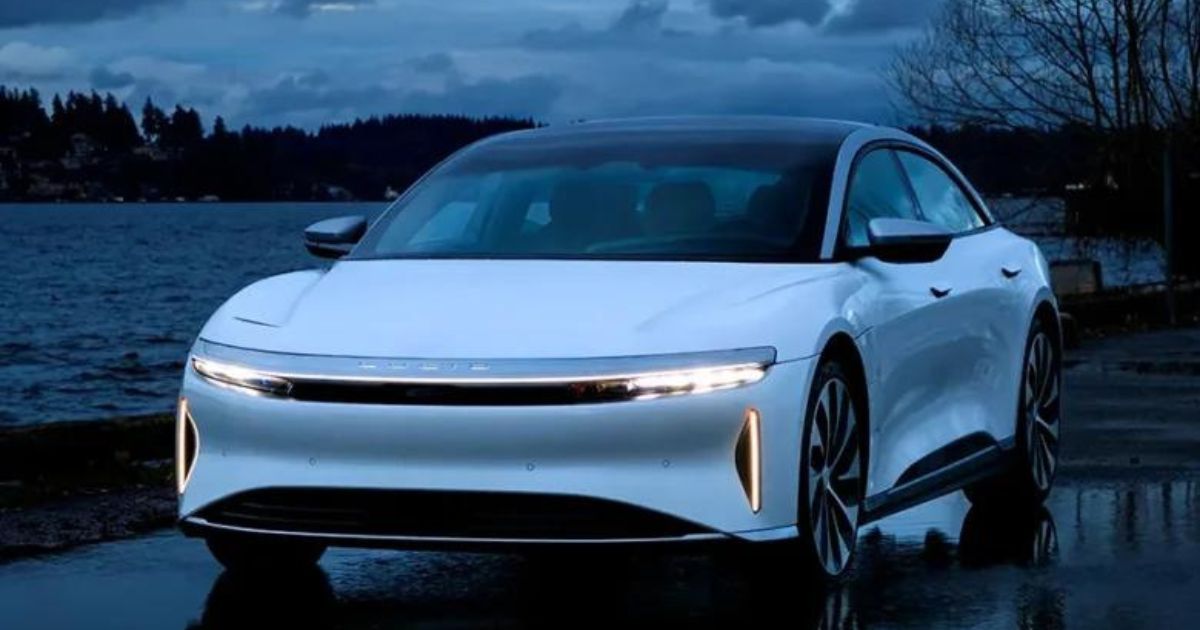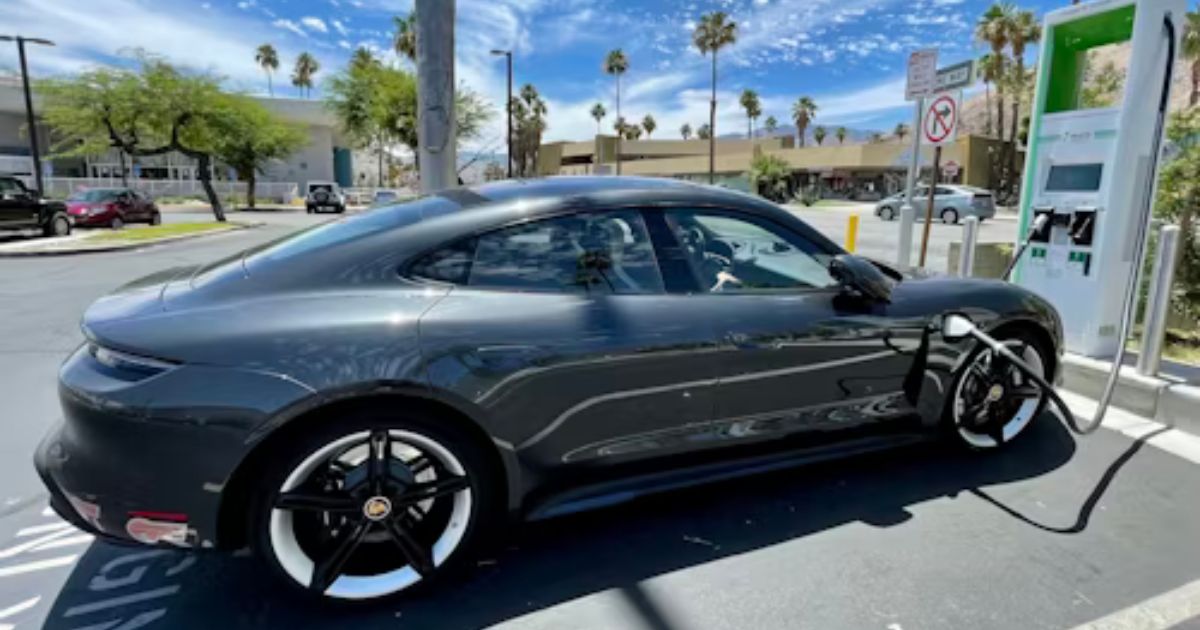Electric cars pollute the air, Electric cars, often praised as a green alternative to traditional gasoline vehicles, have surged in popularity in recent years. But a question remains: Do electric cars pollute the air? While it’s true that electric vehicles (EVs) offer many environmental benefits, they are not entirely from contributing to air pollution. This article will explore the different ways electric cars can impact the air we breathe.
Electric Cars and Air Pollution: A Simple Breakdown
Introduction
Ever wondered if electric cars truly help reduce pollution? With their sleek designs and high-tech appeal, electric cars are often seen as the heroes of the green movement. But there’s more to the story. Let’s dive into how electric cars impact the air we breathe and whether they’re as clean as we think.
Understanding Electric Cars
Definition and Basics
Electric cars, also known as EVs (electric vehicles), are vehicles that run on electricity rather than gasoline or diesel. They use large batteries to store energy and electric motors to drive the wheels. Simply plug them into a charger, and off you go—no gas required!
Popularity and Growth
Over the last decade, electric cars have surged in popularity. From the pioneering Tesla Model S to the affordable Nissan Leaf, more people are making the switch to electric. Governments around the world are also encouraging this shift with incentives and subsidies to promote cleaner transportation.
Electric Cars and the Environment
How Electric Cars Operate
Unlike traditional cars that burn fuel, electric cars draw power from a battery pack. This means they don’t emit exhaust fumes while driving, which is a big win for reducing smog and greenhouse gases in urban areas.
Benefits Over Gas-Powered Cars
The immediate advantage is clear: no tailpipe emissions. This can significantly reduce pollutants like nitrogen oxides and particulate matter, improving air quality and public health. Plus, electric motors are typically more efficient than internal combustion engines, meaning less energy is wasted.
Electric Cars and Air Pollution
| Statement | True/False | Explanation |
| Electric cars pollute the air from their tailpipes. | FALSE |
Electric vehicles produce zero tailpipe emissions. This means they don’t release harmful pollutants like nitrogen oxides and carbon monoxide directly into the air we breathe.
|
| Electric cars don’t contribute to air pollution at all. | FALSE |
While electric cars themselves don’t pollute from the tailpipe, the electricity used to charge them might be generated by power plants that create emissions. However, even considering this, electric vehicles typically have a smaller overall environmental impact than gasoline-powered cars.
|
| Electric cars are better for air quality in the USA. | TRUE |
By reducing tailpipe emissions, electric cars can significantly improve air quality, especially in urban areas with heavy traffic. This can lead to cleaner air and fewer health problems.
|
The Air Pollution Debate
Are Electric Cars Truly Clean?
This is where things get tricky. While electric cars don’t pollute the air directly, the electricity they use often comes from power plants that do. If your EV is charged with electricity from coal or natural gas, its overall environmental benefit can diminish.
Comparing Emissions: Electric vs. Gas
Studies show that even when considering the electricity production, electric cars usually have a smaller carbon footprint over their lifetime compared to gas-powered cars. However, the exact benefit depends on how the electricity is generated. Renewable sources like wind or solar make EVs much greener.
Manufacturing Impact
Battery Production
Producing the large batteries that power EVs can be energy-intensive. Mining for lithium, cobalt, and other materials can also cause environmental damage. This means that the initial production of an electric car can generate more emissions than making a conventional car.
Mining and Resource Use
The extraction of minerals for batteries involves significant environmental disruption, including habitat destruction and pollution from mining operations. Efforts are ongoing to make these processes more sustainable, but challenges remain.
Electricity Production Concerns
Sources of Electricity
The cleanliness of an electric car heavily depends on the source of the electricity used to charge it. If the grid relies heavily on fossil fuels, the benefits of driving an electric car are lessened. Renewable energy, on the other hand, makes electric cars much cleaner.
The Role of Fossil Fuels
In many places, the grid is still dominated by fossil fuels. As a result, charging electric cars with electricity from these sources can indirectly cause pollution. Transitioning to greener energy sources is essential to maximize the benefits of electric vehicles.
Lifetime Emissions Analysis
Emissions From Production to Disposal
When considering the entire life cycle of a car—from production to disposal—electric vehicles generally produce fewer emissions than traditional cars. This includes manufacturing, driving, and recycling or disposing of the car at the end of its life.
Comparing Lifecycle Emissions
Comparative studies suggest that even with the current energy mix, electric cars produce fewer total emissions over their lifetime compared to gas-powered vehicles. As grids become greener, this gap will widen further in favor of electric cars.
Battery Recycling and Disposal
Challenges of Battery Disposal
Disposing of old batteries can be problematic. They contain toxic substances that can harm the environment if not handled properly. Effective recycling is crucial to prevent pollution from these batteries at the end of their life.
Advances in Recycling Technology
Thankfully, battery recycling technology is improving. Innovations are making it possible to recover valuable materials from old batteries, reducing the need for new mining and lessening the environmental impact of battery disposal.
Electric Cars in Different Regions
Impact of Local Energy Mix
The environmental benefit of electric cars can vary greatly depending on where you live. In regions with lots of renewable energy, electric cars are much cleaner. In areas relying on coal, the benefit is less pronounced.
Case Studies: Countries and States
Places like Norway, where most electricity comes from hydropower, see significant benefits from electric cars. Conversely, areas with coal-heavy electricity grids, like some parts of China or India, don’t see as much of an improvement.
The Future of Electric Cars
Innovations in Battery Technology
Ongoing research aims to create batteries that are cheaper, more efficient, and have a lower environmental impact. Solid-state batteries, for example, promise to be safer and more energy-dense than current lithium-ion batteries.
The Rise of Renewable Energy
As renewable energy sources like wind, solar, and hydro become more prevalent, the electricity used to charge electric cars will become cleaner. This will enhance the environmental benefits of switching to electric vehicles.
Government Policies and Incentives
Regulations Promoting Electric Cars
Many governments are setting ambitious targets to phase out gasoline and diesel cars in favor of electric vehicles. These regulations are designed to reduce emissions and encourage the adoption of cleaner transportation.
Subsidies and Incentives
To promote electric cars, subsidies, tax breaks, and other incentives are often provided to consumers. These can significantly reduce the upfront cost of electric cars, making them more accessible to a wider audience.
Consumer Choice and Behavior
Factors Influencing Car Buyers
Cost, range, and charging infrastructure are major factors for consumers when choosing an electric car. Education about the benefits and practicalities of electric vehicles also plays a crucial role in encouraging adoption.
Awareness and Education
Public awareness campaigns and educational programs help potential buyers understand the environmental benefits and long-term savings of electric cars, making them more likely to consider making the switch.
Case for Hybrids and Alternative Fuels
Hybrid Vehicles
Hybrids, which combine a gasoline engine with an electric motor, offer a compromise. They reduce fuel consumption and emissions while eliminating range anxiety associated with fully electric cars.
Other Green Technologies
Alternative fuels like hydrogen and biofuels are also being explored as ways to reduce vehicle emissions. These technologies are in various stages of development and could complement electric vehicles in the future.
Challenges Ahead
Infrastructure Needs
Expanding the network of charging stations is crucial for the widespread adoption of electric cars. Without adequate infrastructure, potential buyers might be hesitant to make the switch.
Technological and Economic Barriers
Costs associated with developing and manufacturing electric cars, particularly the batteries, need to come down. Advances in technology and economies of scale will help, but there are still hurdles to overcome.
Electric cars offer a promising path to reducing air pollution and mitigating climate change. While they aren’t completely from environmental impacts, they generally produce fewer emissions than traditional cars, especially as the energy grid becomes greener. As battery technology improves and renewable energy grows, the benefits of electric cars will only increase. Embracing these advancements while addressing the challenges will be key to a cleaner future.
FAQs
Are electric cars better for the environment than gas cars?
Yes, electric cars typically have lower lifetime emissions compared to gas cars, especially when charged with clean energy.
Do electric cars produce emissions?
Electric cars don’t produce tailpipe emissions, but the overall impact depends on how the electricity used to charge them is generated.
What’s the biggest challenge for electric cars?
The primary challenges include the environmental impact of battery production, the need for better charging infrastructure, and the current reliance on fossil-fuel-based electricity.
How can electric cars become greener?
Electric cars can become greener through advances in battery recycling, improved manufacturing processes, and an increase in renewable energy use for electricity.
Are hybrids a good alternative to electric cars?
Hybrids offer a middle ground, reducing emissions compared to gas cars while avoiding some of the limitations of fully electric vehicles, such as range concerns.


